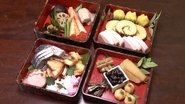
On New Year's Day, Japanese families gather to share a special meal called Osechi. It consists of multiple colorful dishes, often served in multi-tiered boxes. The custom has diversified in recent years, but it remains deeply rooted in Japanese society. This time, our theme is Osechi. Food history researcher Ayao Okumura discusses its little-known origins, and its continued importance. And in Plus One, Matt Alt looks at the chopsticks used to eat Osechi, and what they rest on. Air Date : 7th-Jan-2020 Read More

In Japan, the craft beer boom is in full swing. One pub in Kyoto Prefecture takes a particularly innovative approach -- they use Japanese ingredients like tea, salt and citrus fruit to brew new and interesting beers. One of the co-owners is Thomas Ainsworth, from Australia. In a Japanophiles interview, he introduces Peter Barakan to several of his beers, and explains how they're made. He also talks about how combining tea and beer is contributing to a brighter future for Wazuka, a famous tea-producing town. Air Date : 28th-Jan-2020 Read More

A "Sunakku" is a small bar with counter seating and a friendly host. There are thousands of them spread across the country, and many Japanese visit them regularly, to talk about their day, sing karaoke and meet new people. This time, our theme is "Sunakku." Mayuko Igarashi, a journalist, explains how they work, and why they're such an important part of many people's lives. And in Plus One, Matt Alt investigates an innovative bar aimed at the elderly, which is staffed by nurses. Air Date : 18th-Feb-2020 Read More

In March 2011, a catastrophic earthquake and tsunami devastated communities on the east coast of Tohoku, northeast Japan. We visit the region 9 years on, to learn how people coped with the disaster and its aftermath. This time, we hear about survivors who say they've encountered the spirits of the dead. We also learn how bereaved parents use statues to stay in touch with children who have died. Our guests include Shigeru Kamei, who receives messages from his late wife in dreams. Air Date : 10th-Mar-2020 Read More

In March 2011, a catastrophic earthquake and tsunami devastated communities on the east coast of Tohoku, northeast Japan. We visit the region 9 years on, to learn how people coped with the disaster and its aftermath. This time, we learn about folklore in Tono, where legends about supernatural beings serve as a medium for sharing the advice of ancestors. Our guests include Yuko Kikuchi, a professional storyteller. She speaks about the local tales, and explains why they're so important. Air Date : 17th-Mar-2020 Read More

In Japan, professional wrestling has gained popularity as an entertaining combination of entertainment and sport. In recent years, Japanese professional wrestling has even become popular abroad. A key factor in this success has been the shrewd judgment of New Japan Pro-Wrestling CEO Harold George Meij. Using his business expertise, Meij has taken steps to improve fan involvement and marketing strategies. In a Japanophiles interview, Meij tells Peter Barakan about his passion for professional wrestling. Air Date : 24th-Mar-2020 Read More

There are over 90,000 cleaning establishments in Japan, and a huge number of Japanese use them regularly. Innovative machinery makes the process cheap and efficient. Stubborn stains are removed by masters of their craft. This time, our theme is laundry services. Our guest is Suzuki Kazuyuki, the third-generation owner of a Fukushima laundry business. He takes us behind the scenes at an industrial laundry plant. And in Plus One, David McMahon investigates a modern "coin laundry." Air Date : 7th-Apr-2020 Read More
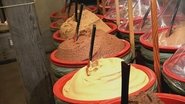
Miso, a fermented soybean paste, is a bedrock of Japanese cuisine. For many Japanese, it offers a taste of home. It is made using koji mold, a fermentation starter that flourishes in Japan. This time on Japanology Plus, our theme is miso. Our guest, university professor Kanauchi Makoto, explains its health benefits, and demonstrates its many creative uses in Japanese cooking. And in Plus One, Matt Schley discovers the surprising new ways miso is being served in modern-day Japan. Air Date : 21st-Apr-2020 Read More

Rakugo is a traditional form of storytelling that emerged in 17th century Japan. Using minimal props, a single performer creates amusing and sometimes moving scenes featuring multiple characters. Johan Nilsson Bjoerk, from Sweden, is one of Japan's very few foreign Rakugo professionals. In a Japanophiles interview, he tells Peter Barakan about the artform. He also talks about his 4 years as an apprentice to the veteran performer Sanyutei Koraku. Air Date : 4th-Aug-2020 Read More
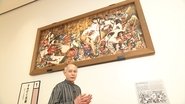
Over the centuries, Japan has suffered from repeated outbreaks of diseases like smallpox, measles and cholera. Where did the people of the past think these epidemics came from? And how did they cope? Our theme this time is Japan vs. Epidemics. Our main guest is Yamamoto Satomi, an art historian. She explains historical attitudes to disease by examining works of art, and the characters they feature. We also take a look at a contemporary social media trend. Air Date : 18th-Aug-2020 Read More
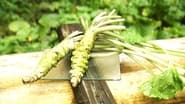
Wasabi is a plant that grows natively in Japan's mountain valleys. It's used to make a condiment with a distinctive green color and an eye-watering impact. Most commonly served with sushi and soba, it is a pillar of Japanese cuisine. Our theme this time on Japanology Plus is wasabi. Our main guest is Mukasa Chieko, a food journalist. She talks about the plant's many surprising uses. We also meet Mita Shinichi, a farmer who explains the intricacies of wasabi cultivation. Air Date : 1st-Sep-2020 Read More

Geisha have existed for hundreds of years, but in modern Japan they are declining in number. It's a story that's repeated across many forms of traditional Japanese culture. This time on Japanology Plus: the world of geisha, and the challenges ahead. Our main guests, Watanabe Kazuko and Mayumi, run a geisha association, and have decades of experience in the industry. They explain the challenges they face, and offer insights into how hard it can be to maintain tradition. Air Date : 8th-Sep-2020 Read More

Throughout Japanese history, expert craft skills requiring dexterity and judgment have enhanced everyday life. These skills are often applied by anonymous local artisans, who have inherited them from generations past. This time on Japanology Plus, we take a close look at expert craft skills, and the value they hold. Our main guest is Fukasawa Naoto, a renowned product designer who is also the director of The Japan Folk Crafts Museum. He talks about his philosophy of simplicity in design. Air Date : 15th-Sep-2020 Read More
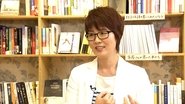
South Korean film, TV drama and music have been popular in Japan for some time, but more recently there's been a growing appreciation for Korean literature. One of the major contributors to that trend is Kim Seungbok, from South Korea, who set up a publishing company and bookshop in Tokyo. In a Japanophiles interview, she tells Peter Barakan about her love of books, and about her efforts to introduce the literature of her home country to a Japanese audience. Air Date : 29th-Sep-2020 Read More
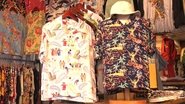
Aloha shirts are popular symbols of Hawaii, worn by tourists and Hawaiians alike. A look back at their history reveals a Japanese connection -- they were often made by people of Japanese descent, using materials and techniques from kimono making. This time on Japanology Plus, our theme is aloha shirts. Our main guest, Nakano Yoshihiro, has worked with the garments for over 20 years. He goes into detail about the contribution Japanese made to their origin and development. Air Date : 6th-Oct-2020 Read More

Kohfukuji, a World Heritage Site, is a prominent Buddhist temple in Nara, western Japan. One of its priests is Gyoei Saile, from Germany. In a Japanophiles interview, he tells Peter Barakan how his interest in Buddhism developed, and we learn about the extremely difficult exam he had to pass in order to become eligible to assume the abbacy of Kohfukuji. Saile also takes us through his daily routine, and offers thoughts on the role that Buddhism can play in contemporary Japan. Air Date : 13th-Oct-2020 Read More

Rice crackers and other rice-based snacks have been widely consumed in Japan for hundreds of years. Each region of the country has its own twist. Some places use seafood, while others use wheat flour. This time on Japanology Plus, our theme is rice snacks. Our main guest is Kodama Kyoko, an independent food journalist and an authority on rice crackers. She talks about their history, and explains how the rice snack industry is diversifying to fit modern needs. Air Date : 20th-Oct-2020 Read More

A significant portion of Japan's manufacturing industry is handled by small factories known as "urban workshops," with less than 30 workers. Despite their small scale, a number of urban workshops are globally renowned. This time on Japanology Plus, our theme is urban workshops. Our main guest is university professor Hashimoto Hisayoshi. He takes us to several workshops, and draws attention to some of their chief characteristics. Air Date : 3rd-Nov-2020 Read More

Tokyo is a crowded city. Its rooftops represent valuable space, and they're used in some very creative ways. This time on Japanology Plus, our theme is Tokyo rooftops. Our main guest is Kurakata Shunsuke, an architectural history specialist from Osaka City University. He takes us on a tour of amusement parks, gardens and other unique rooftop spaces. We also meet photographer Takano Akira, who shows us his favorite city rooftops. Along the way we discover rooftop shrines, rice fields and many more surprises. Air Date : 10th-Nov-2020 Read More

The city of Tokyo is normally crowded with tourists, but the COVID-19 pandemic has transformed the city's sightseeing spots. In a series called Tokyo Stories, Peter Barakan meets Tokyo residents who are not originally from Japan, to hear how their lives have been affected. This time he meets Josh Grisdale, who was born in Canada. Due to cerebral palsy, Grisdale has only limited movement in his arms and legs. He talks about his daily life, and the theme of accessibility in the realm of tourism. Air Date : 17th-Nov-2020 Read More

The city of Tokyo is normally crowded with tourists at all times of the year, but the COVID-19 pandemic has transformed it. In a series called Tokyo Stories, Peter Barakan meets residents not originally from Japan, to hear how their lives have been affected. This time he speaks with Mateusz Urbanowicz, from Poland. He paints scenes from the city, such as the colorful storefronts of independent shops, and rainy, neon-lit nightscapes. He explains his view of Tokyo's urban development. Air Date : 24th-Nov-2020 Read More

The Ainu people are indigenous to Japan, and the Ainu community is now concentrated in Hokkaido Prefecture, the northernmost main island. The Ainu have long maintained a distinct culture and language, but very few speakers of the language remain. In a Japanophiles interview, Peter Barakan meets Anna Bugaeva, a Russian linguist who has spent 2 decades recording and analyzing the Ainu language. She shares some of the insights she has acquired through her long association with Ainu culture. Air Date : 1st-Dec-2020 Read More

Japan is home to thousands of different mushroom species. Some can be found lining the supermarket shelves, but others serve as natural tourist attractions, and even a poisonous species may be used to make dye. This time on Japanology Plus, our theme is mushrooms. Our main guest is Eguchi Fumio. He talks about his research into the health benefits of mushrooms, and their potential use in new medicines. And in Plus One, we discover some of Japan's more unusual species. Air Date : 22nd-Dec-2020 Read More
Kamishibai, or paper theater, is a form of storytelling that uses large picture cards. It was wildly popular throughout Japan in the 1930's. Today, it's still enjoyed in kindergartens and libraries. This time, our theme is Kamishibai. Our main guest, Sakai Kyoko, talks about how Kamishibai titles are created, and how they should be performed. And in Plus One, we meet American poet Arthur Binard, whose own Kamishibai communicates the horror of the atomic bomb. Air Date : 29th-Dec-2020 Read More
 Disclaimer - This is a news site. All the information listed here is to be found on the web elsewhere. We do not host, upload or link to any video, films, media file, live streams etc.
Kodiapps is not responsible for the accuracy, compliance, copyright, legality, decency, or any other aspect of the content streamed to/from your device.
We are not connected to or in any other way affiliated with Kodi, Team Kodi, or the XBMC Foundation.
We provide no support for third party add-ons installed on your devices, as they do not belong to us.
It is your responsibility to ensure that you comply with all your regional legalities and personal access rights regarding any streams to be found on the web. If in doubt, do not use.
Disclaimer - This is a news site. All the information listed here is to be found on the web elsewhere. We do not host, upload or link to any video, films, media file, live streams etc.
Kodiapps is not responsible for the accuracy, compliance, copyright, legality, decency, or any other aspect of the content streamed to/from your device.
We are not connected to or in any other way affiliated with Kodi, Team Kodi, or the XBMC Foundation.
We provide no support for third party add-ons installed on your devices, as they do not belong to us.
It is your responsibility to ensure that you comply with all your regional legalities and personal access rights regarding any streams to be found on the web. If in doubt, do not use.
 Kodiapps app v7.0 - Available for Android.
You can now add latest scene releases to your collection with Add to Trakt. More features and updates coming to this app real soon.
Kodiapps app v7.0 - Available for Android.
You can now add latest scene releases to your collection with Add to Trakt. More features and updates coming to this app real soon.

War of the Worlds Extinction 2024 - Movies (Mar 28th)
Sex-Positive 2024 - Movies (Mar 28th)
The Farmers Daughter 2025 - Movies (Mar 28th)
Dangerous Lies Unmasking Belle Gibson 2025 - Movies (Mar 28th)
Flight Risk 2025 - Movies (Mar 28th)
Alexander and the Terrible Horrible No Good Very Bad Road Trip 2025 - Movies (Mar 28th)
The Life List 2025 - Movies (Mar 28th)
Renner 2025 - Movies (Mar 28th)
The Rule of Jenny Pen 2024 - Movies (Mar 28th)
Bring Them Down 2024 - Movies (Mar 27th)
Love Hurts 2025 - Movies (Mar 27th)
Holland 2025 - Movies (Mar 27th)
The House Was Not Hungry Then 2025 - Movies (Mar 27th)
One Million Babes BC 2024 - Movies (Mar 27th)
Through the Door 2024 - Movies (Mar 27th)
Snow White 2025 - Movies (Mar 27th)
England’s Lions The New Generation 2025 - Movies (Mar 26th)
The Last Keeper 2024 - Movies (Mar 26th)
The Brutalist 2024 - Movies (Mar 25th)
Mufasa The Lion King 2024 - Movies (Mar 25th)
The Monkey 2025 - Movies (Mar 25th)
The One Show - (Mar 29th)
On Patrol- Live - (Mar 29th)
The Last Word with Lawrence ODonnell - (Mar 29th)
The Rachel Maddow Show - (Mar 29th)
The Patrick Star Show - (Mar 29th)
Helsinki Crimes - (Mar 29th)
One Killer Question - (Mar 29th)
The Bold and the Beautiful - (Mar 29th)
Cops - (Mar 29th)
The Price Is Right - (Mar 29th)
The Young and the Restless - (Mar 29th)
Lets Make a Deal - (Mar 29th)
The Kelly Clarkson Show - (Mar 29th)
All In with Chris Hayes - (Mar 29th)
Diners, Drive-Ins and Dives - (Mar 29th)
Gold Rush - (Mar 29th)
Horrible Histories - (Mar 29th)
WWE SmackDown - (Mar 29th)
The Beat with Ari Melber - (Mar 28th)
Gogglebox - (Mar 28th)